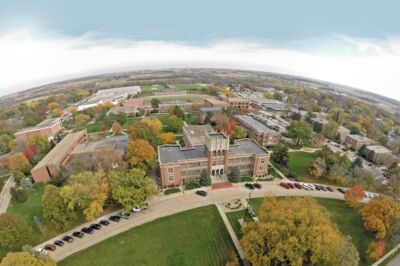Small vs. Large School – Which Size Fits You?

Today’s universities are a diverse mix of institutions with a variety of priorities, emphases, and available resources. They come in all different shapes and sizes – literally – and can vary drastically in some respects while remaining similar in others. It is for these reasons that choosing a college of the right size can be a hard decision. Considering the pros and cons of studying at an institution of a particular size is often the best course of action when you are unsure which type may fit you and your goals.
Most articles will define a “large” university as one with over 15,000 students and a “small” university as one with less than 5,000 students. For the purposes of this article, these numbers are adequate – but keep in mind that colleges of all sizes can feel large or small depending on other factors, such as physical campus size.
If you are someone who loves to engage with others, thrives in a high-energy environment, and is heavily involved in extracurricular activities, a larger college may be a good fit for you. Because of the vast number of students who attend large universities, activities and opportunities for engagement are virtually unlimited. It’s likely that you will be able to find a club that suits any interest you may have, from beekeeping to heavy metal music. On the academic side of things, larger colleges tend to offer more major and minor areas of study, so it can be easier to earn a degree in a more specific field.
However, large colleges also come with some drawbacks. Most notably, professors at large universities are generally responsible for a lot of students – think full lecture halls! This means that personal attention given by professors (or even advisers) to each student is much less than at a smaller college. Though large colleges may offer more academic programs of study, it is often much harder and more time-consuming to go through the process of changing your program at a large university.
Interacting with other students can also pose a challenge at large universities. Although you will likely find others who share your major in some classes, it may be hard to interact with them in classes that can consist of a hundred or more students. In addition, it can be hard to spend time with students outside of your major.
Contrast these descriptions with that of a small college, where class and campus sizes are generally smaller and student-to-professor ratios are much lower. At colleges with smaller student bodies, it can be easier to find friends and interact with students in different majors. Smaller campus sizes can contribute to a greater sense of connection between and community among students. Relationships with faculty and staff are less difficult to form, and one-on-one attention from professors is not uncommon.
Many think of small colleges, however, as being more expensive than larger public colleges. For many students, cost is a significant factor in their college decision, and many may feel that they simply cannot afford the cost of a private education. Fortunately, Concordia Nebraska works with families to ensure that they have the most accurate information on the true costs of attending college, as well as offering an average of $29,000 in institutional aid to each undergraduate student every year.
For students who like the idea of a quieter college life, perhaps in a small town, as well as an experience that is personalized to them, a smaller university may be the place to go. Both introverts and extroverts can thrive at a small college: introverts because of the calmer atmosphere, and extroverts because of the ability to stand out and form social connections with a considerable portion of the student body. Plus, many smaller colleges are uniquely Christian and can bolster your college education by providing a firm foundation of faith.
Overall, small and large colleges both have their benefits and drawbacks – when choosing one or the other, what matters is the characteristics that you are searching for in a college. It is often the case that what you may see as a benefit of a certain size of university appears as a drawback to another student. While this article is not comprehensive in listing all possible positive and negative aspects of the sizes of U.S. colleges, it can serve as a starting place for further research.
Do you want to learn more about studying at Concordia University, Nebraska? Schedule a visit here.
Related Stories


